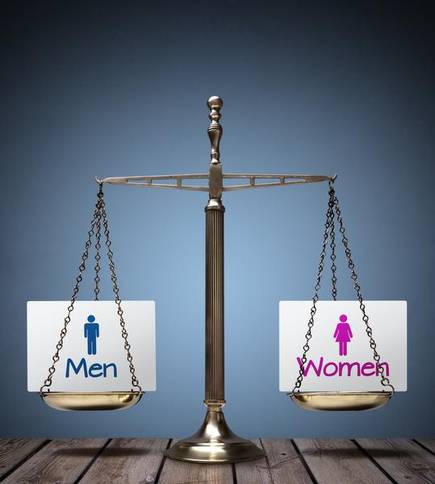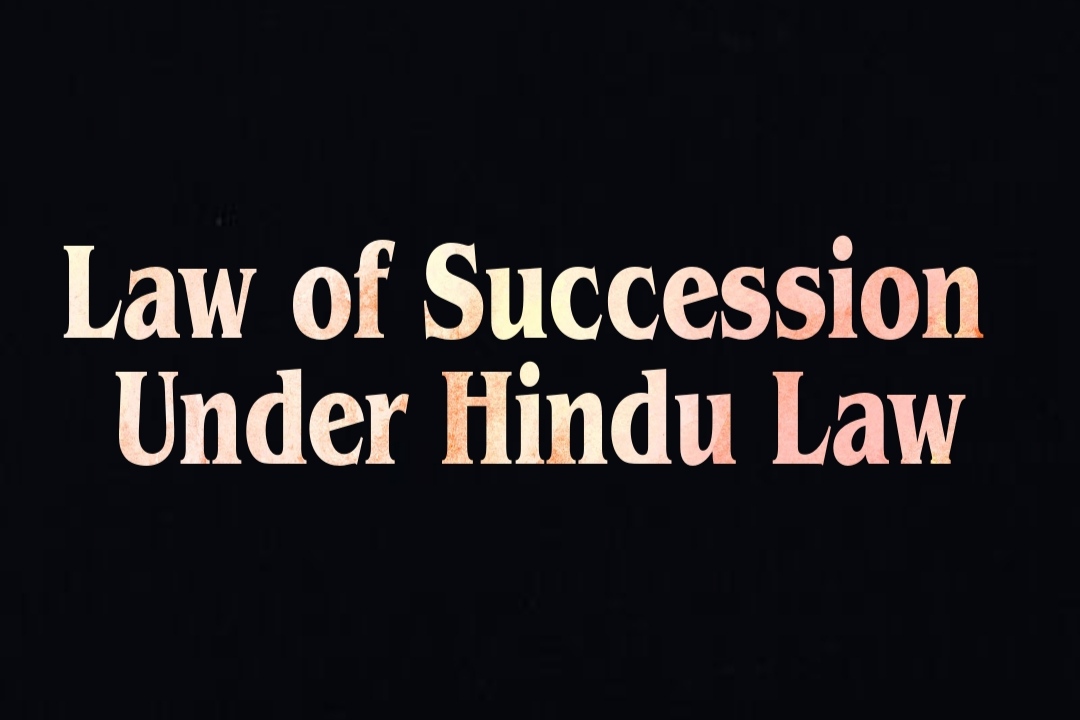Introduction
In Hindu society, Hindus are presumed to live together as one joint family. Members of the Hindu joint family shares everything from food to estate. Hence, it is important to understand the concept of inheritance under Hindu law. The Hindu Succession Act, 1956 deals with the laws of succession for Hindus. It applies to any person who is legally defined as Hindu and any person who is a Buddhist, Jain, or Sikh by religion. The act deals with the inheritance and succession of the property. There are two types of succession namely as follows:
Testamentary Succession
Testamentary succession is where the succession of the parties is governed by a testament or a will. Under Hindu Law, both a Hindu male as well as a Hindu female, are competent to make a will for the property, including that of a share in the undivided Mitakshara coparcenary property, in favor of anyone. In such a case, the property will devolve according to the will of the deceased. The distribution should be under the provision of the will and not under the law of inheritance.
Intestate Succession
Intestate succession is when someone dies without any will or testament. Under such cases, the property is distributed among the legal heirs by the law of inheritance. The law on intestate succession for different communities in India is governed by different succession laws applicable for that particular community.
The Hindu Succession Act, 1956

The Hindu Succession Act, 1956 is an act of parliament of India. It lays down a uniform system of inheritance and succession into one act. Some of the significant features of this act are as follows:
- Separate succession for male and female: Under Hindu law, both the male and the female had different heirs. The Hindu Succession Act, 1956 brought a revolutionary change in the categories of both the heirs, however, the principles of differences of heirs were retained.
- Equality between son and daughter: During ancient times, daughters were not considered as equal heirs with sons to the property of their father. The son did not receive any property from his mother in the presence of his daughter. However, The Hindu Succession Act, 1956, made them equal co-heirs to the property of both parents.
- No limits on agnates and cognate heirs: Both agnates and cognates are recognized as heirs. There was a limit of degrees beyond which both cognates and agnates ceased to inherit. The Hindu Succession Act, 1956 confers inheritance on agnates ad infinitum. Only when there is no agnate, comes the turn of the cognate relatives.
- Strangers cannot inherit: During ancient times, only three strangers were allowed to inherit the property name as the spiritual preceptor, the spiritual disciple and, the spiritual co-student. However, under The Hindu Succession Act, 1956, they are no longer recognized as heirs.
- Heirs of intestate female: During ancient times, there were a lot of factors that determine the heirs of intestate females such as marital status of the female, the form of her marriage, and the nature of the stridhan which was to descend. However, The Hindu Succession Act, 1956, simplifies the rules and made different rules regarding the property inherited by the mother or the father and the property inherited by the husband or father-in-law. Marital status plays an important role in deciding the inheritance, therefore, the distinction based on marriage cannot be removed.
- Disqualified Heirs: Under the Hindu Succession Act, 1956, Remarriage is made a disqualification for the son’s widow, son’s son’s widow and, the brother’s widow. Idiocy, lunacy, and unchastity are no longer disqualifications under The Hindu Succession Act, 1956.
Gender Position Before 2005 Amendment
Under The Hindu Succession Act, 1956, daughters also had rights in their father’s estate. Mothers, widows, and daughters were considered primary heirs. However, under the mitakshara coparcenary, only males were considered as coparceners. According to Section 6, of the act, if the deceased has left a surviving female relative specified in Class I of the Schedule I or a male relative specified in that Class who claims through such female relation, the interest of a deceased in mitakshara coparcenary property shall devolve by testamentary of intestate succession under the Act and not as survivorship.
As per Section 23 of The Hindu Succession Act, 1956, daughters were denied the right to residence in the parental home unless she is a widow, disserted, or separated from the husband. They have been disentitled to ask for partition until male heirs choose to divide their respective shares. Both the provisions Section 6 as well as Section 23 of The Hindu Succession Act, 1956, have been controversial as it violates women’s rights in the inheritance of the property.
Amendments To The Hindu Succession Act, 1956 And Gender Equality

The amending act of 2005 was an attempt to end discrimination based on gender. Section 6 of the act was amended by the amending act of 2005 and equal rights were given to the daughters in the Hindu mitakshara coparcenary property. Section 23 was also amended and the female heir to ask for partition in respect of dwelling house wholly occupied by a Joint Family until male heirs choose to divide their respective shares therein was omitted. According to the amending act of 2005, under the joint Hindu family governed by the mitakshara family, the daughter of a coparcener would be given the same right as the son. But this provision does not apply to the daughters married before the commencement of the Hindu Succession (Amendment) Act of 2005.
This amending Act of 2005 has also a clear provision that after commencement of the Amending Act of 2005, no court shall recognize any right to proceed against a son, grandson, or great-grandson for the recovery of any debt due from his father, grandfather, or great grandfather (on the ground of the pious obligation under the Hindu Law), of such son, grandson or great-grandson to discharge any such debt.
Rule Of Ownership In The Case Of Males
Section 8 of the Hindu Succession Act, 1956 deals with the general rule in the case of males. It deals with the cases that were opened after the commencement of the act. However, the death of the male Hindu doesn’t need to take place after the commencement of the act. Heirs are classified into four categories:
− Class I
− Class II
− Class III (Agnates)
− Class IV (Cognates)
- Class I Heirs: Class I heir consists of Sons, Daughters, Widows, Mothers, Sons of a predeceased son, Widows of a predeceased son, Son of a predeceased son of a predeceased son, Widows of a predeceased son of a predeceased son, Daughter of a predeceased son, Daughter of a predeceased daughter, Daughter of a predeceased son of a predeceased son, Son of a predeceased daughter, Daughter of a predeceased daughter of a predeceased daughter, Son of a predeceased daughter, Son of a predeceased daughter of a predeceased daughter, Daughter of a predeceased daughter of a predeceased son, Daughter of a predeceased son of a predeceased daughter.
They have the absolute rights to the property and their share is separate. If one of them is not present, even then the property will not be inherited by the class II heirs. Under the Hindu Succession (Amendment) Act, 2005, class heir consisted of twelve heirs but after 2005, four new heirs were added, of which five are males and eleven are females.
- Class II Heirs: Class II heirs consists of Father, Son’s Daughter’s son, Son’s daughter’s daughter, Brother, Sister Daughter’s son’s son, daughter’s son’s daughter, daughter’s daughter’s son, daughter’s daughter’s daughter, Brother’s son, sister’s son, brother’s daughter, sister’s daughter Father’s father, father’s mother, Father’s widow, brother’s widow, Father’s brother, father’s sister, Mother’s father, mother’s mother, Mother’s brother, mother’s sister.
If no one from the class I heirs takes the property, then class II falls in line to get the property.
- Class III Heirs: Class III heirs consist of the agnates of the deceased. When none from the earlier classes gets the property, class III inherits the property. An agnate is a person related to intestate only through male relatives. It can be both, a male as well as a female.
- Class IV Heirs: A cognate is related to the intestate through mixed relatives in terms of sex. If no one from the earlier three classes exists, then it goes to the cognates.
Rule Of Ownership In Case Of Females
Under the Hindu Succession (Amendment) Act, 2005, it was decided that daughters would be entitled to the same rights as sons. The amendment act serves as a defender for female rights. The property in case of a female Hindu intestate dying will devolve through:
− Mother’s heirs
− Father’s heirs
− Husband’s heirs
− Upon mother/father
− Sons/daughters (also the children of a predeceased son of a predeceased daughter) and the husband.
In the case of any property that is being inherited by a female Hindu by her father or mother and if there is no son or daughter of the deceased (including a child of predeceased son or daughter), then it shall devolve in favor of the heirs of the father. Similarly, in the case of any property being inherited by a female Hindu by her husband or her father in law, and if there is no son or daughter of the deceased (including the child of a predeceased son or daughter), it shall devolve in favor of the heirs of the husband.
Landmark Judgements

Prakash vs Pulavati and Ors., 2016
In this case, the Supreme Court held that the Amendment Act was prospective. Hence, from the passing date of the Amendment Act, the daughters would be coparceners and have an equal share same as that of sons in a joint Hindu family property.
Lokmani v. Mahadevamma & Ors., 2016
In this case, the High Court held that Section 6 of the Hindu Succession Act, 1956, is given retrospective effect as when the daughters were denied right in the coparcenary property, pending proceedings and appeals. According to the amended provision, inequality has been removed.
Danamma v. Amar, 2018
In this case, the court held that the daughters would get a share in the property, even though their father had passed away before the Amendment Act, 2005. The daughter can only claim her rights from the date of the amendment and any transaction concerning the property will not be affected according to the amendment.
Vineet Sharma v. Rakesh Sharma & Ors., 2018
In this case, the court held that Section 6 of the Hindu Succession Act, 1956, provides an unobstructed heritage by birth to the daughter. The court also held that it is not all necessary that the father of the daughter should be living as on the date of the amendment act 2005, as she has not been conferred the rights of a coparcener by obstructed heritage.
Ramkali v. Mahila Shyamwati, 2000
In this case, it was held that a woman who was in a void or a voidable marriage, and that marriage was nullified by the Court on the death of the husband, would not be called his widow and would not have rights to succeed to his property.
Conclusion
The concept of Hindu law was based on the prolonged practice of patriarchy. With the advent of the Hindu Succession (Amendment Act), 1956, women are also treated equally as men. Legislation has played an important role in the upliftment of women, both economically and socially. The judgments passed by the judiciary deserve an appreciation for the upliftment of women. Both the legislature as well as judiciary worked for gender equality and justice and it is reflected in the Hindu Succession Act, 1955.
Frequently Asked Questions (FAQs)
What happens if the father dies without a will?
In case a male dies intestate, i.e., without making a will, his assets shall be distributed according to the Hindu Succession Act and the property is transferred to the legal heirs of the deceased.
Who are disqualified heirs for succession?
Any person who commits the murder or assists the murder shall be disqualified from inheriting the property of the person, or any property in the promotion to succession to which he or she committed the murder.
Can the wife claim the husband’s property?
A wife is entitled to inherit an equal share of her husband’s property. However, if the husband has excluded her from his property through a will, she does not have a right to her husband’s property. Moreover, a wife has a right to her husband’s ancestral property.
Is a married daughter a legal heir?
Married daughters have been included as legal heirs from 2005 as per the amendment in the Hindu Succession Act. Married daughters have equal rights in the family property as that of sons. Also, the legal heir certificate will contain the name of the married daughter.
Who cannot reopen a partition?
Every female of the Hindu joint Family has no right to partition in the property except in the cases of the father’s wife, mother, paternal, grandmother, and widow of the coparcener.
Who is the heir of Hindu Male?
The son/ daughter will still be the class 1 legal heir of the Hindu male if he dies intestate and will inherit the ancestral as well as the self-acquired property of the Hindu male.
What is the difference between de jure and de facto partition?
De Jure Partition is a division of right, i.e., severance of status, here partition has taken place but actual possession has not been given whereas De facto Partition means when the partition has taken place by metes and bounds, here ownership, as well as possession of a property, has been transferred.
